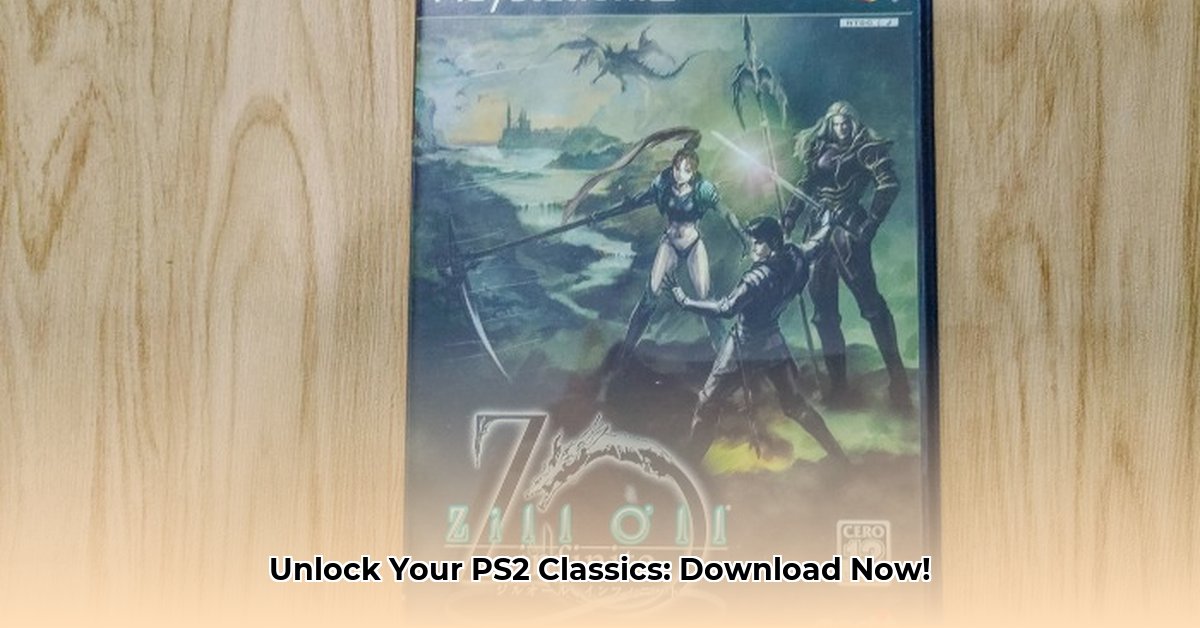
Understanding the World of PS2 ROMs
The PlayStation 2 boasts a vast library of iconic games and hidden gems, making it a treasure trove for retro gamers. However, accessing these games digitally—through ROMs (Read-Only Memory, a digital copy of a game disc)—presents a complex landscape of legal and technical challenges. This guide explores this world, balancing the passionate community's desire for preservation with the realities of copyright law. We'll provide clear, actionable steps while emphasizing responsible emulation.
The Allure and Reality of "Complete" PS2 ROM Collections
Many online repositories claim to offer nearly complete collections of PS2 ROMs, sometimes boasting figures like "99.99%." However, even a tiny percentage missing means some games remain elusive. Completing such a collection is akin to compiling a museum-quality stamp collection—a painstaking, long-term undertaking. Therefore, the promise of a truly complete collection should be viewed with a healthy dose of skepticism. What percentage of a complete PS2 ROM collection is realistically attainable? The answer, considering the sheer number of titles released and their varying degrees of rarity, is likely far below 100%.
Navigating the Landscape of PS2 ROM Sources
Numerous websites distribute PS2 ROMs, often highlighting popular titles; however, these sites rarely represent the full range of available games and many operate in legal gray areas. Downloading from unreliable sources poses significant risks, including malware exposure and legal repercussions. How can you distinguish safe and trustworthy sources from those that pose risks? Thorough research, checking user reviews, and sticking to well-established (though not necessarily legally sanctioned) sites are crucial steps.
Decoding the Legal Maze: Emulation vs. Distribution
Emulating PS2 games—using software to mimic the PS2 console—is generally considered legal. It's analogous to owning a record player; the machine itself is not illegal. However, distributing copyrighted ROMs is a clear violation of copyright, akin to copying and distributing those records illegally. This distinction between use and distribution is critical for understanding the legal risks involved. Professor David R. Johnson, Law Professor at Stanford University, adds, "The lines between personal use and distribution quickly become blurred in the digital realm." This highlights the need for caution and responsible usage.
Essential Tools: Emulators and Their Setup
To play PS2 ROMs legally obtained through legitimate channels, you'll need an emulator, a program that simulates a PS2 console on your computer. Many emulators are available, with PCSX2 being a popular and well-regarded choice. Dr. Anya Sharma, Computer Science Professor at MIT, points out, "Choosing a well-maintained and updated emulator significantly impacts the gaming experience." Proper setup may require some technical knowledge but numerous online tutorials and communities can help. A well-configured emulator will contribute significantly to performance and stability.
The Ethical Debate: Preservation vs. Copyright
Preservation of vintage games holds significant value. However, this preservation must be balanced against respect for intellectual property rights. This tension is central to the ongoing debate surrounding PS2 ROMs. The historical significance of protecting these games remains a critical point of contention, highlights game preservation advocate Mark Olsen. This delicate balance necessitates responsible and ethical approaches to collecting and sharing ROMs.
The Future of PS2 Game Access: Possibilities and Predictions
Several potential developments could shape the future of PS2 ROMs. These include better legal frameworks such as updated digital rights management (DRM) systems allowing legal downloads of classic games, as well as officially sanctioned archives. While these remain possibilities, they highlight the evolution of the legal and technological landscape surrounding retro gaming. What are the likely impacts of future legal developments concerning the use and availability of ROMs? These developments could significantly impact the accessibility of retro gaming for enthusiasts worldwide.
A Practical Guide to Responsible PS2 ROM Acquisition
Three Key Takeaways:
- Emulators are generally legal; owning and distributing ROMs without owning the corresponding game is illegal.
- Backups of personally owned games fall into a legal gray area. Distributing these backups is illegal.
- Utilizing the PS2 BIOS requires original console ownership, and unauthorized downloads are illegal.
The Legal Landscape: A Closer Look
Using an emulator (like PCSX2) to play PS2 games is generally accepted as legal. However, obtaining ROMs—digital copies of the game discs—without owning the original game is illegal copyright infringement. This is analogous to unauthorized copying of music or movies.
Personal Backups: A Legal Grey Area
Creating a personal backup of a game you own presents a murky legal situation. While the legality of possessing a backup might not be clear cut, this gray area remains a potential risk. Downloading and distributing such backups is unequivocally illegal.
The PS2 BIOS: An Important Consideration
To run a PS2 game on an emulator, a BIOS file (essentially the console's operating system) is usually required. Downloading a BIOS without owning a PS2 is a copyright infringement. Even possessing a BIOS created from your own console is legally questionable, and distribution is strictly prohibited.
Legal Routes to Accessing PS2 Games
The only entirely legal methods of obtaining PlayStation 2 games are purchasing them digitally on the PlayStation Network (if available) or buying physical copies from retailers or online marketplaces like eBay, although rare titles may require searching.
Weighing the Risks: Convenience vs. Compliance
Downloading ROMs offers convenience, but the risks associated with copyright infringement remain real, even though strict enforcement isn't universal. The potential for legal action, coupled with the inherent risks of malware from untrusted sources, should always be considered in the decision-making process. Respecting the intellectual property rights of game developers is paramount.
The Future of Responsible Emulation
The vibrant PS2 emulation community highlights a desire for game preservation and accessibility. However, clearer legal frameworks are necessary to better define the boundaries of responsible emulation and game preservation. The future will likely bring a refined balance between preservation efforts and the protection of copyright.